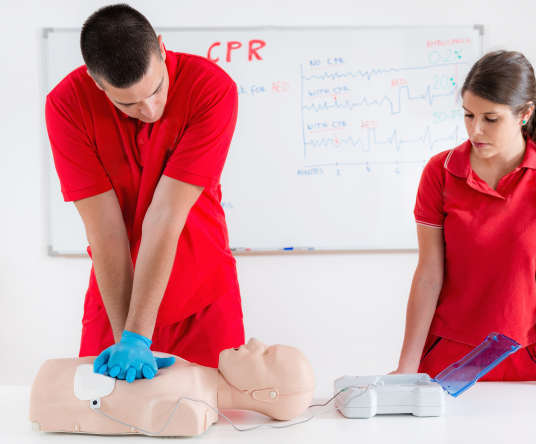Chapter 18: Nervous System Emergencies
The brain and central nervous system control nearly every part of the body, from movement and sensation to reasoning, reflexes, and vital signs like heart rate and blood pressure. Because of this, injuries to the brain, spine, or nervous system can have serious effects elsewhere in the body. Quick and correct First Aid is essential in these cases.

What Can Cause a Nervous System Emergency?
These emergencies can happen due to both medical conditions and physical trauma. Some common causes include:
- Diseases like Parkinson’s, Alzheimer’s, or MS
- Infections
- Mental health conditions like anxiety or depression
- Problems with blood flow or organ failure
- Head or spinal injuries
- Tumors
Signs and Symptoms
Every emergency looks a little different, but common signs include:
- Chest pain or pressure
- Sudden confusion or slurred speech
- Numbness or tingling
- Seizures
- Headache or vomiting
- Trouble breathing
- Weakness or paralysis
- Drainage from the nose or ears
- Loss of balance or coordination
Emergency Types and How to Respond
- Heart Attack
A heart attack happens when blood flow to part of the heart is blocked. The person might complain of chest pain, nausea, shortness of breath, or pain in their back, jaw, neck, or arms.
What to do: If they’re not allergic to aspirin, aren’t bleeding, and aren’t showing signs of stroke, give one full-dose or two low-dose aspirins. Call 9-1-1 right away and stay with them.
- Seizure
Seizures are sudden bursts of abnormal brain activity. They can cause full-body shaking or just a brief spell of confusion or staring. Causes include epilepsy, injury, low blood sugar, missed meds, or toxins.
What to do: Move objects out of the way so the person doesn’t get hurt. Don’t try to hold them down. If they vomit and you’re sure there’s no head or spine injury, gently roll them into the recovery position. Call 9-1-1.
- Stroke
A stroke usually hits fast. Blood flow to the brain is either blocked or interrupted by a rupture. Symptoms include a sudden headache, dizziness, drooping on one side, or loss of coordination or speech.
What to do: Call 9-1-1 right away. Make note of when the symptoms started. If the person becomes unresponsive and you don’t suspect a spinal injury, gently place them in the recovery position.
- Spinal or Head Injury
These injuries can stop the brain from sending signals to the rest of the body. They’re often caused by car accidents, falls, or sports injuries. You might see nausea, confusion, sleepiness, or even paralysis.
What to do: Don’t move the person unless there’s immediate danger. If they begin vomiting and you must roll them, try to keep their head, neck, and spine as still as possible. Call 9-1-1 and follow dispatcher instructions.
If they stop breathing or lose consciousness, start Cardiopulmonary Resuscitation (CPR) or Hands-Only CPR if you’re not trained to give breaths.
You’ll come back to these steps often in this Online First Aid Course, and they’ll help you act quickly and safely when every second matters.

